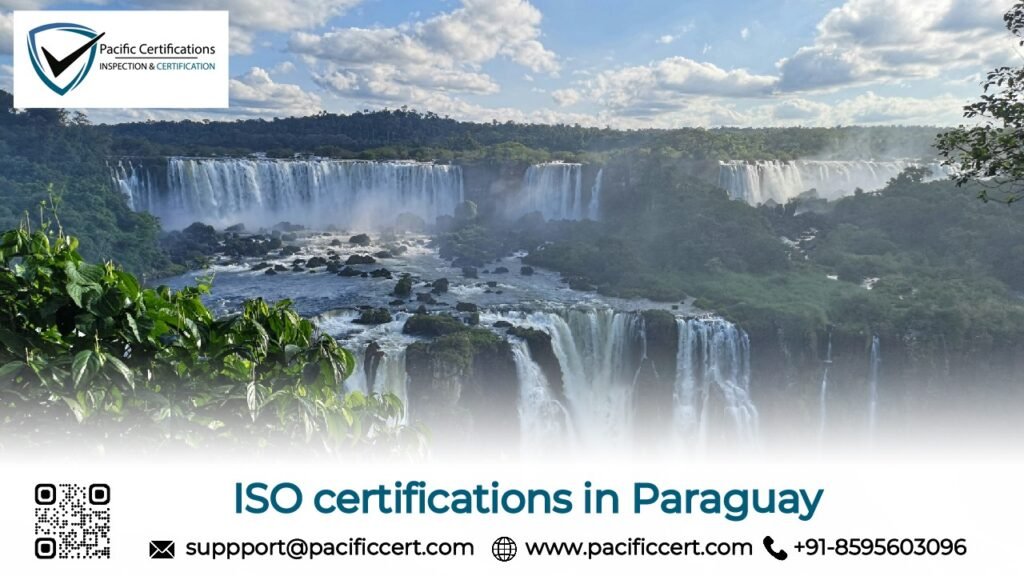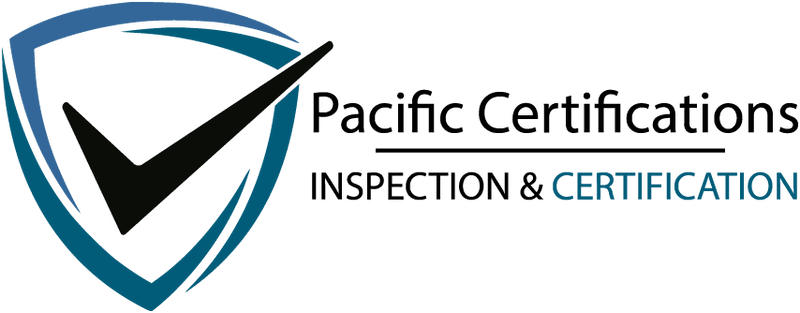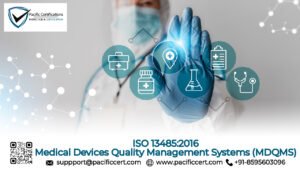
ISO Certifications in Paraguay and How Pacific Certifications can help
ISO certifications in Paraguay are becoming more prevalent as businesses strive to meet international benchmarks. Whether in manufacturing, agriculture, healthcare, or services, ISO standards provide a framework for organizations to improve their processes, meet regulatory requirements, and gain customer trust. The adoption of ISO standards in Paraguay reflects the country’s commitment to aligning with global best practices, facilitating trade, and enhancing competitiveness on the international stage.
Are you seeking ISO certification for your business in Paraguay? Contact us today at support@pacificcert.com or call +91-8595603096 to get started with your certification journey.
Popular ISO Standards in Paraguay
While there are thousands of ISO standards covering various industries and sectors, some have gained particular prominence in Paraguay due to their relevance to the country’s key industries. Here are some of the most popular ISO standards in Paraguay:
ISO 9001: Quality Management Systems
ISO 9001 is the most widely recognized and implemented quality management standard, provides a framework for organizations to ensure consistent quality in their products and services, enhancing customer satisfaction and operational efficiency.
ISO 14001: Environmental Management Systems
ISO 14001 standard helps organizations manage their environmental responsibilities in a systematic manner, reducing environmental impact and ensuring compliance with environmental regulations.
ISO 45001: Occupational Health and Safety Management Systems
Workplace safety is a critical concern for many industries in Paraguay, including construction, manufacturing, and agriculture. ISO 45001 provides a framework for managing occupational health and safety risks, ensuring a safe working environment for employees, and reducing workplace incidents.
ISO 27001: Information Security Management Systems
ISO 27001 helps organizations establish, implement, and maintain an effective information security management system, protecting sensitive data from cyber threats and ensuring regulatory compliance.
ISO 22000: Food Safety Management Systems
Paraguay’s agricultural and food processing sectors are significant contributors to the economy. ISO 22000 is crucial for these industries, providing a framework for managing food safety risks, ensuring the safety of food products, and meeting international food safety standards.
ISO 50001: Energy Management Systems
ISO 50001 helps organizations manage their energy use more effectively, reducing energy consumption, lowering costs, and minimizing environmental impact.
Click here to find out more applicable standards to your industry
Looking to achieve ISO certification for your company in Paraguay? Reach out to us at support@pacificcert.com or +91-8595603096 for expert assistance and seamless certification services.
Market News
In this year, the demand for ISO certifications in Paraguay is on the rise, driven by the country’s efforts to integrate more deeply into global trade networks and its focus on sustainable development. According to recent market research, Paraguayan businesses are increasingly seeking ISO certifications in export markets. The Paraguayan government has also been promoting ISO standards as part of its broader economic development strategy, recognizing the role these certifications play in attracting foreign investment and boosting the quality of local products and services.
One significant trend in 2024 is the growing adoption of ISO 14001 and ISO 50001, reflecting the global shift towards sustainability and energy efficiency. Companies in Paraguay are becoming more aware of their environmental responsibilities, and these standards are helping them align with international environmental goals, such as the United Nations’ Sustainable Development Goals (SDGs).
If you’re in Paraguay and need ISO certification for your business, we’re here to help. Contact us at support@pacificcert.com or call +91-8595603096 to learn how we can support your certification process.
How We Can Help
At Pacific Certifications, we understand the critical role that ISO certifications play in helping organizations achieve excellence. As a certification body, we are dedicated to assisting businesses in Paraguay with the audit and certification process, ensuring they meet the rigorous requirements of ISO standards. It is important to note that while we provide audit and certification services, we do not offer consultancy or implementation services. Our role is to assess your organization’s compliance with ISO standards and issue certifications accordingly.
We work closely with our clients to understand their specific needs and tailor our audit services to meet those requirements. Our team of experienced auditors brings a wealth of knowledge and expertise, ensuring that your certification process is smooth and aligned with international best practices.
Ready to enhance your business in Paraguay with ISO certification? Get in touch with our team at support@pacificcert.com or call +91-8595603096 for professional audit and certification services.
Requirements of ISO Standards in Paraguay
The requirements for each ISO standard vary based on the specific focus of the standard. Below is an overview of the key requirements:
ISO 9001: Quality Management Systems
- Context of the Organization: Understanding the organization and its context, including identifying external and internal issues that could impact the QMS.
- Leadership: Top management must demonstrate leadership and commitment to the QMS, establish a quality policy, and assign roles and responsibilities.
- Planning: Organizations must establish quality objectives and plan actions to address risks and opportunities, as well as to meet the requirements of the QMS.
- Support: This includes resource management, competence, awareness, communication, and documented information (control of documents and records).
- Operation: Organizations must plan and control processes needed to meet quality objectives, including requirements for product or service provision, design and development, and control of externally provided processes, products, and services.
- Performance Evaluation: Monitoring, measurement, analysis, and evaluation of the QMS, including customer satisfaction, internal audits, and management reviews.
- Improvement: Organizations must continuously improve the QMS, addressing non-conformities and implementing corrective actions to prevent recurrence.
ISO 14001: Environmental Management Systems
- Context of the Organization: Understanding the external and internal environmental issues that could affect the EMS and identifying relevant interested parties and their requirements.
- Leadership: Top management must demonstrate leadership and commitment to the EMS, establish an environmental policy, and define roles and responsibilities.
- Planning: Organizations must identify environmental aspects and impacts, assess risks and opportunities, and establish environmental objectives and plans to achieve them.
- Support: This includes resource management, competence, awareness, communication, and documented information relevant to the EMS.
- Operation: Planning and implementing processes to meet environmental objectives, including operational controls, emergency preparedness, and response plans.
- Performance Evaluation: Monitoring, measuring, analyzing, and evaluating environmental performance, including internal audits and management reviews.
- Improvement: Organizations must continually improve the EMS by addressing non-conformities and taking corrective actions to enhance environmental performance.
ISO 45001: Occupational Health and Safety Management Systems
- Context of the Organization: Understanding the external and internal factors that could affect the OHSMS, as well as the needs and expectations of workers and other interested parties.
- Leadership and Worker Participation: Top management must demonstrate leadership and commitment to the OHSMS, establish an OH&S policy, and ensure worker participation in the system.
- Planning: Identifying hazards, assessing OH&S risks and opportunities, and establishing OH&S objectives and plans to achieve them.
- Support: Managing resources, ensuring worker competence, raising awareness, and controlling documented information related to the OHSMS.
- Operation: Planning and controlling OH&S operations, including risk controls, emergency preparedness, and response plans.
- Performance Evaluation: Monitoring, measuring, analyzing, and evaluating OH&S performance, conducting internal audits, and holding management reviews.
- Improvement: Continuously improving the OHSMS by addressing non-conformities, taking corrective actions, and enhancing OH&S performance.
Each of these ISO standards has specific requirements designed to help organizations achieve excellence in their respective areas, whether it’s quality, environmental management, occupational health and safety, information security, food safety, or energy management. Implementing these standards ensures compliance with global best practices and also drives continuous improvement within the organization.
Need ISO certification for your Paraguayan business? Contact Pacific Certifications at support@pacificcert.com or +91-8595603096 to find out how we can help you achieve compliance and excellence.
Benefits of ISO Standards in Paraguay
Implementing ISO standards offers a wide array of benefits to organizations across various industries. Below is an overview of the specific benefits associated with each of the most popular ISO standards: ISO 9001, ISO 14001, ISO 45001, ISO 27001, ISO 22000, and ISO 50001.
Benefits of ISO Certifications
- ISO 9001 helps organizations consistently meet customer expectations, leading to higher satisfaction and customer loyalty.
- ISO 9001 provides a structured approach to identifying and mitigating risks.
- ISO 9001 is recognized worldwide as a mark of quality.
- Implementing ISO 14001 helps organizations identify and manage their environmental aspects and impacts.
- ISO 14001 ensures that organizations stay compliant with local, national, and international environmental regulations.
- By optimizing resource use and reducing waste, organizations can achieve significant cost savings.
- ISO 45001 helps organizations create a safer working environment by identifying and controlling workplace hazards, reducing the risk of accidents, injuries, and illnesses.
- ISO 45001 standard helps organizations stay compliant with health and safety regulations.
- ISO 27001 provides a systematic approach to protecting sensitive information, reducing the risk of data breaches, cyber-attacks, and other security incidents.
- ISO 22000 helps organizations identify and control food safety hazards, ensuring that food products are safe for consumption throughout the supply chain.
- ISO 50001 helps organizations identify opportunities to improve energy performance, leading to reduced energy consumption and lower energy costs.
Each of these ISO standards provides organizations with a framework for achieving excellence in quality, environmental management, occupational health and safety, information security, food safety, and energy management. The benefits of implementing these standards extend beyond compliance, driving improvements in efficiency, cost savings, and stakeholder confidence.
For businesses in Paraguay seeking ISO certification, look no further. Contact us at support@pacificcert.com or call +91-8595603096 to start your path to certification with Pacific Certifications.
Who Needs ISO Certifications in Paraguay
ISO certifications are beneficial for a wide range of organizations across various industries in Paraguay. Here are some examples of who might need ISO certifications:
Manufacturing Companies
Manufacturing companies in Paraguay, particularly those involved in export markets, can benefit from ISO 9001, ISO 14001, and ISO 45001 certifications. These standards help ensure product quality, environmental sustainability, and workplace safety.
Agricultural and Food Processing Businesses
Companies involved in agriculture and food processing can benefit from ISO 22000 certification to manage food safety risks and meet international food safety standards.
Healthcare Organizations
Healthcare providers, including hospitals and clinics, can benefit from ISO 9001 and ISO 45001 certifications to ensure quality care and a safe working environment for employees.
Information Technology and Cybersecurity Firms
IT and cybersecurity firms can benefit from ISO 27001 certification to manage information security risks and protect sensitive data from cyber threats.
Construction and Engineering Firms
Construction and engineering firms can benefit from ISO 9001 and ISO 45001 certifications to ensure quality management and occupational health and safety on construction sites.
Energy and Utilities Companies
Energy companies and utilities can benefit from ISO 50001 certification to improve energy efficiency and reduce environmental impact.
Service Providers
Service providers in various industries, including finance, logistics, and transportation, can benefit from ISO 9001 certification to enhance service quality and customer satisfaction.
Government Agencies
Government agencies in Paraguay can benefit from ISO certifications to improve public services, ensure regulatory compliance, and demonstrate a commitment to quality and efficiency.
Certification Process for ISO Standards in Paraguay
The process of achieving ISO certification in Paraguay involves several steps, each designed to ensure that the organization meets the requirements of the relevant ISO standard. Here’s a step-by-step overview of the certification process:
Gap Analysis (Optional)
Before starting the certification process, some organizations may choose to conduct a gap analysis to identify areas where they need to improve to meet the ISO standard.
Implementation of the Management System
The organization must implement the necessary management system that complies with the requirements of the chosen ISO standard.
Internal Audit
Once the management system is in place, the organization conducts an internal audit to assess its effectiveness and identify any areas of non-conformity.
Management Review
Top management reviews the results of the internal audit and makes any necessary adjustments to the management system.
Certification Audit
The certification audit is conducted by a third-party certification body, such as Pacific Certifications. The audit typically consists of two stages:
- Stage 1 Audit: The auditor reviews the organization’s documentation and readiness for the certification audit.
- Stage 2 Audit: The auditor conducts a more detailed assessment, including on-site/online inspections, interviews with employees, and a review of the management system’s implementation. The goal is to verify that the organization meets all the requirements of the ISO standard.
Corrective Actions
If the certification audit identifies any non-conformities, the organization must take corrective actions to address them. This may involve revising processes, retraining employees, or making other necessary changes.
Certification Decision
After the certification audit, the auditor prepares a report and makes a recommendation regarding certification. If the organization meets all the requirements, the certification body issues the ISO certificate.
Surveillance Audits
ISO certifications are valid for three years, but organizations must undergo regular surveillance audits to ensure ongoing compliance with the standard.
Recertification
At the end of the three-year certification period, the organization must undergo a recertification audit to renew its ISO certification.
Achieving ISO certification is a significant milestone for any organization, demonstrating a commitment to quality and sustainability. If you are ready to take the next step towards ISO certification in Paraguay, we at Pacific Certifications are here to help you through the audit and certification process.
Pacific Certifications is accredited by ABIS, in case you need support with ISO certification for your business in Paraguay, please contact us at support@pacificcert.com or +91-8595603096.
FAQs: ISO Certifications in Paraguay
ISO certification is a process by which an organization’s management systems, processes, or products are evaluated and certified as meeting the requirements of a specific ISO standard. It is important because it demonstrates an organization’s commitment to quality, safety, and efficiency, and can enhance credibility, customer satisfaction, and market access.
The time required to achieve ISO certification varies depending on the size and complexity of the organization, the standard being implemented, and the organization’s readiness. On average, the process can take anywhere from a few months to over a year.
Yes, small businesses can benefit significantly from ISO certification. It helps them improve their processes, gain a competitive edge, and meet customer and regulatory requirements. ISO certification can also open up new market opportunities for small businesses.
The costs of ISO certification vary depending on factors such as the size of the organization, the standard being certified, and the certification body. Costs typically include audit fees, certification fees, and any expenses related to implementing the necessary management systems.
Hiring a consultant is not mandatory, but some organizations choose to do so to help with the implementation of the ISO standard. However, it is important to note that Pacific Certifications only provides audit and certification services and does not offer consultancy, gap analysis, training, or implementation services.
ISO certifications are typically valid for three years. However, organizations must undergo regular surveillance audits (usually annually) to ensure ongoing compliance. At the end of the three-year period, a recertification audit is required to renew the certification.
If an organization fails the certification audit, the auditor will provide a report detailing the non-conformities. The organization must then take corrective actions to address these issues before a follow-up audit can be conducted. Once the non-conformities are resolved, the organization can proceed with the certification process.
Yes, ISO certification is often recognized as a mark of quality and reliability in international markets. It can help your organization meet the requirements of foreign customers, comply with international regulations, and gain a competitive advantage in global trade.
ISO certification is awarded to organizations that meet the requirements of a specific ISO standard. Accreditation, on the other hand, is the formal recognition that a certification body, such as Pacific Certifications, is competent to carry out certification activities. Accreditation ensures that the certification body operates according to international standards and is recognized globally.
To get started with the ISO certification process, you can contact Pacific Certifications at support@pacificcert.com or +91-8595603096. Our team will guide you through the process, from the initial audit to the issuance of the ISO certificate.
Read More at: Blogs by Pacific Certifications








